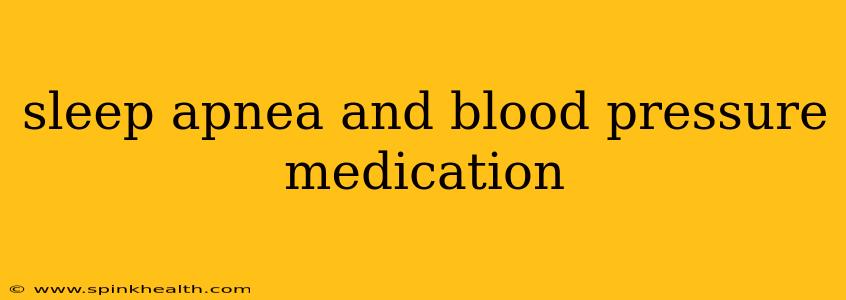Sleep apnea and high blood pressure (hypertension) are a dangerous duo. Imagine this: you're struggling to breathe throughout the night, your body constantly jolted awake. This constant disruption wreaks havoc on your cardiovascular system, significantly increasing your risk of high blood pressure. But the story doesn't end there. The interplay between sleep apnea and blood pressure medication is intricate, making it crucial to understand the connection.
Let's unravel this complex relationship, addressing some common questions along the way.
How Does Sleep Apnea Affect Blood Pressure?
Sleep apnea, characterized by repeated pauses in breathing during sleep, triggers a cascade of events that negatively impact blood pressure. Each apneic event leads to a drop in blood oxygen levels. Your body responds by releasing stress hormones like adrenaline and cortisol, causing your heart to beat faster and your blood vessels to constrict. This constant cycle of oxygen deprivation and stress response places significant strain on your cardiovascular system, leading to chronically elevated blood pressure. It's like your body is perpetually under pressure, never getting the rest it needs to function optimally.
Does Sleep Apnea Make Blood Pressure Medication Less Effective?
This is a crucial point. Yes, sleep apnea can significantly reduce the effectiveness of your blood pressure medication. Think of it this way: your medication is working to lower your blood pressure, but the constant surges caused by sleep apnea are effectively counteracting the medication's efforts. This means that even with medication, your blood pressure remains dangerously high, increasing your risk of heart attack, stroke, and other serious cardiovascular complications.
Can Blood Pressure Medication Worsen Sleep Apnea?
Some blood pressure medications, particularly certain types of calcium channel blockers, have been linked to a potential increase in sleep apnea severity. However, this is not universally true, and the impact varies greatly depending on the individual and the specific medication. It's crucial to discuss any concerns with your doctor. They can assess your individual risk factors and make appropriate adjustments to your medication regimen or treatment plan.
What are the Symptoms of Sleep Apnea?
Recognizing the symptoms of sleep apnea is crucial for early intervention. Common signs include:
- Loud snoring: Often interrupted by periods of silence.
- Daytime sleepiness: Feeling excessively tired even after a full night's sleep.
- Morning headaches: Waking up with a headache is a common symptom.
- Difficulty concentrating: Brain fog and trouble focusing are often experienced.
- Irritability: Feeling constantly frustrated or short-tempered.
- Nocturnal choking or gasping: These episodes can be frightening and disrupt sleep.
If you experience several of these symptoms, it's essential to seek medical advice. A sleep study can definitively diagnose sleep apnea.
How is Sleep Apnea Treated?
Treatment for sleep apnea typically involves addressing the root cause. Continuous Positive Airway Pressure (CPAP) therapy is the most common and effective treatment, providing a constant stream of air to keep the airway open during sleep. Oral appliances, surgery, and lifestyle changes (such as weight loss and avoiding alcohol before bed) may also be considered, depending on the severity and underlying cause of your sleep apnea.
Is it Important to Treat Both Sleep Apnea and High Blood Pressure?
Absolutely! Treating both conditions is paramount to reducing your overall cardiovascular risk. Successfully managing sleep apnea can significantly improve your blood pressure control, even making it possible to reduce your reliance on medication in some cases. The two conditions are intertwined, and addressing one directly impacts the other.
This complex interaction highlights the importance of regular check-ups with your doctor, particularly if you have a history of hypertension or suspect you might have sleep apnea. Early diagnosis and effective treatment for both conditions are vital to protecting your heart health and overall well-being. Remember, your doctor is your best resource for personalized advice and treatment strategies.

